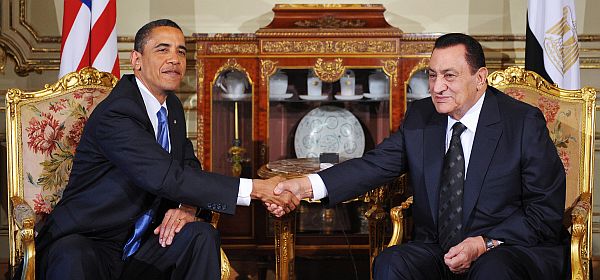Now Iran feels the heat
On Monday, as Tehran once again became the scene of clashes between the security forces and demonstrators defying the government’s ban on street rallies, the paradoxical impact of the Arab world’s democratic awakening on Iran became glaringly obvious.
External, that is, geopolitical gains, may go hand-in-hand with political losses at home, and much depends on the government’s political savvy to close a credibility gap, as reflected in its open embrace of Egypt’s revolution while, simultaneously, trying to shut down the opposition movement on its streets known as the Green movement.
Thousands of protesters took to the streets in answer to calls from opposition parties in support of the uprisings in Tunisia and Egypt that have led to the leaders in those countries stepping down. They met strong resistance from the security forces, who fired into the air and used tear gas in the streets near Azadi (Freedom) Square, the announced site of the rally. At least one person was reported killed and many injured.
The rally soon turned into an anti-government demonstration, as happened in the 2009 street protests following disputed elections that saw President Mahmud Ahmadinejad earn a second term.
Notably on Monday, though, rather than anger being directed at Ahmadinejad and his administration, sections of the crowd were heard shouting against Supreme Leader Ayatollah Ali Khamenei, the heart of power in the Islamic Republic. This is an unusual development.
In contrast to muted comments on the weeks-long street unrest in Egypt, United States Secretary of State Hillary Clinton expressed support for “the aspirations of the people” who took to the streets in Iran on Monday. (Asia Times)
Bahrain: ‘day of rage’ simmers
Jasmine may be the scent sweeping across parts of the Arab world, but tear gas was the smell that permeated parts of Bahrain today.
A “day of rage” planned by Bahraini youths has resulted in clashes between demonstrators and security forces. As the day went on, the confrontations grew increasingly frequent and violent, with groups of as many as hundreds seen challenging lines of riot police. Despite a government promise to allow peaceful protests, riot police have used rubber bullets and tear gas to break up demonstrators.
It is the first significant public protest in the oil-rich Gulf since Tunisia and Egypt ousted their presidents through widespread revolt.
The Gulf Cooperation Council, a loose bloc of Arab peninsula states, is arguably the world’s richest country club, with over a trillion dollars stashed away in foreign reserves and almost half the planet’s proven oil reserves still underground. This wealth has bought autocratic rulers domestic support and helped insulate the bloc from the current wave of Arab unrest.
However, Bahrain, the smallest of the GCC countries, is starting to look like the odd one out, due to its strained government finances and unique demographic makeup.
Unlike the rest of the Gulf, Bahrain is a Shia-majority country ruled by a Sunni royal family. The Shia, and some Sunni liberals, have for decades complained about limited rights, discrimination and heavy-handed rule. (Financial Times)
Unrest in Bahrain could threaten key U.S. military outpost
The tiny oil-producing state just off the east coast of Saudi Arabia is home to the U.S. Navy’s Fifth Fleet, headquarters for a U.S. Marine Corps amphibious unit and a crucial base for U.S. Air Force jet fighter interceptors and spy planes.
Bahrain gives Washington a base in the very heart of the Gulf from which it can protect and monitor the movement of 40% of the world’s oil through the Strait of Hormuz, spy on Iran and support pro-Western Gulf states from potential threats.
The United States has had a naval presence in Bahrain since 1947, but that waned in 1977 when an agreement to allow Washington to dock its Middle East Fleet in Bahrain was terminated following unsuccessful Shiite attempts to end the Khalifa monarchy and expel the U.S. Navy.
In the 1990s, the U.S. naval presence was renewed and expanded as a result of the First Gulf War, when Bahrain became a primary coalition naval base and the centre of air operations against Iraqi targets.
The Fifth Fleet, with 15 warships and an aircraft carrier battle group, has made Bahrain its headquarters since 1991.
Still, the U.S. military presence has always been a sore point in the emirate’s tumultuous politics and Washington has been sensitive to the impact its bases might have on the Muslim state.
Iran, which has frequently threatened to choke off oil shipments through the Strait of Hormuz if attacked, would love to see the U.S. Navy expelled from Bahrain and can be expected to encourage the Shiite opposition. (National Post)
Thousands rally across Yemen
Thousands of protesters have taken to the streets across Yemen for the fourth straight day, demanding political reforms and the downfall of Ali Abdullah Saleh, the country’s long-serving president.
The 3,000-strong throng of demonstrators in the capital, Sanaa, comprising students, human rights activists and lawyers clad in black robes, clashed with police and pro-government supporters on Monday.
Rival groups, armed with clubs and rocks, were seen facing off after supporters of Saleh reportedly confronted the protesters.
At least three people were injured, including one stabbed with a traditional Yemeni dagger, in fighting outside Sanaa’s university where protesters chanted: “A revolution of free opinion … A revolution of freedom … We should be allowed to decide.”
Further chants of “After Mubarak, Ali” and “No corruption after today” reverberated around the city. (Al Jazeera)
Syria jails schoolgirl blogger for 5 years
A special Syrian security court sentenced a teenaged blogger on Monday to five years in jail on charges of revealing information to a foreign country, despite U.S. calls to release her, rights defenders said.
The long jail term for high school student Tal al-Molouhi, under arrest since 2009 and now 19 years old, is another sign of an intensifying crackdown on opposition in Syria in the wake of the Tunisian and Egyptian revolutions, they said.
Molouhi had written articles on the Internet saying she yearned for a role in shaping the future of Syria, which has been under the control of the Baath Party for the last 50 years.
She also asked U.S. President Barack Obama to do more to support the Palestinian cause. A security court charged her several months ago with “revealing information that should remain hushed to a foreign country”.
Wearing trousers and a cream coloured wool hat, Molouhi was brought chained and blindfolded under heavy security on Monday to the court, which convenes at a cordoned section of the Palace of Justice in the centre of the Syrian capital.
Molouhi was motionless after hearing the sentence and said nothing. Her mother, who was waiting in the courtyard, burst out crying after being told the sentence.
Lawyers, the only ones allowed in the closed session, said the judge — there are no prosecutors in the special court — did not give evidence or details as to why Molouhi was charged. (Reuters)
Thousands of community leaders sign allegiance letter to Jordan’s King Abdullah
More than 3,000 tribal leaders and key figures on Monday signed a letter addressed to His Majesty King Abdullah in which they pledged loyalty to the Hashemite Throne and expressed faith in the King’s reform efforts.
The letter, a copy of which was made available to The Jordan Times, included former prime ministers, former ministers, ex-senior military officers, current and former MPs, tribal leaders as well as academicians from different tribal affiliations and walks of life.
“At a time when the country is witnessing openness to the media and freedom of expression, some groups have started to raise their voices taking advantage of the regional turbulence seeking publicity,” veteran MP Abdul Karim Dughmi (Mafraq) told The Jordan Times yesterday.
Recently, Dughmi said, some individuals who claimed to be “defenders of the country’s interests” started to raise their voices but in a wrong manner, adding that freedom of expression is a right guaranteed by the Constitution as long as it does not undermine security and stability of the country. (Jordan Times)


 After an exchange between the UAE ambassador to the US Yousef al-Otaiba and Jeffrey Goldberg on Tuesday we learn that “the UAE would sooner see military action against Iran’s nuclear program than see the program succeed” — at least that’s what Goldberg says.
After an exchange between the UAE ambassador to the US Yousef al-Otaiba and Jeffrey Goldberg on Tuesday we learn that “the UAE would sooner see military action against Iran’s nuclear program than see the program succeed” — at least that’s what Goldberg says.